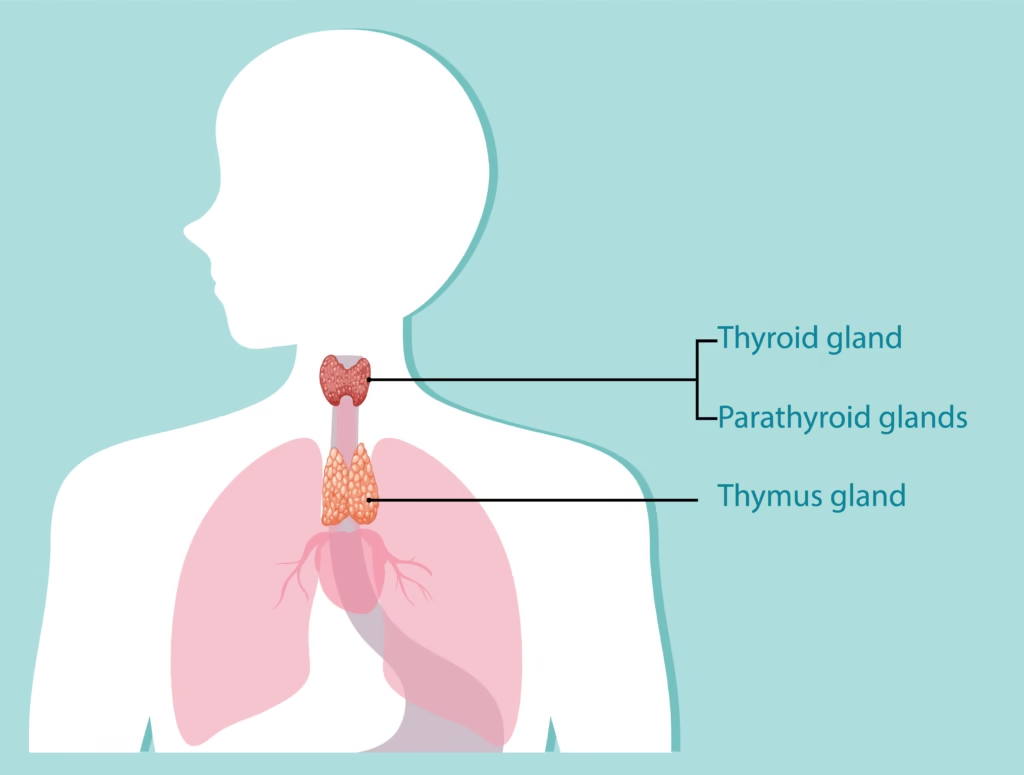Hyperthyroidism explained by a doctor. Learn about causes, symptoms, diagnosis, treatment, and real-life management tips for an overactive thyroid in this in-depth guide.
By Dr. Ishani Tanna, Family Physician
Table of Contents
Introduction
Have you ever felt your heart racing for no clear reason, experienced unexpected weight loss, or found yourself sweating excessively, even in cool weather? These aren’t just signs of stress or heat — they could indicate a condition known as hyperthyroidism, where the thyroid gland works in overdrive.
As a family doctor, I often come across patients who are either unaware of their thyroid condition or confuse hyperthyroidism with hypothyroidism (its opposite). This blog aims to provide a complete guide to hyperthyroidism, covering its causes, signs, diagnostic tests, and treatment options, all explained in simple, patient-friendly language — yet backed by medical expertise.
Let’s begin by understanding this powerful little gland and what happens when it gets out of control.
What Is Hyperthyroidism?
The thyroid gland is a small, butterfly-shaped organ located at the base of your neck, just below the Adam’s apple. It produces hormones — mainly thyroxine (T4) and triiodothyronine (T3) — that regulate your body’s metabolism, energy use, temperature, heart rate, and even mental function.
In hyperthyroidism, your thyroid gland becomes overactive, producing more hormones than your body needs.When your thyroid pumps out too many hormones, it’s like hitting the gas pedal on your body’s engine — everything starts running faster than it should. If you don’t catch it early and get the right treatment, it could throw your system into chaos and lead to some pretty serious health problems down the line.
While hyperthyroidism affects people of all ages, it is especially common in women aged 20 to 40, and often runs in families.

How Common Is Hyperthyroidism?
According to global studies, hyperthyroidism affects around 1 in 100 people, with women being 5 to 10 times more likely to develop it than men. In India, subclinical (mild, asymptomatic) hyperthyroidism is often missed, especially in rural areas or due to self-medication with iodine-rich supplements.
Causes of Hyperthyroidism
There are several possible causes of hyperthyroidism, and identifying the right one is essential for proper treatment. The most common causes include:
1. Graves’ Disease (Autoimmune Hyperthyroidism)
- The most common cause of hyperthyroidism worldwide.
- It is an autoimmune disorder where the immune system produces TSH receptor antibodies (TRAb), stimulating the thyroid gland to produce more hormone.
- Often seen in young women and may be triggered by stress, infection, or pregnancy.
2. Toxic Nodular Goiter (Multinodular or Solitary Toxic Nodule)
- The thyroid develops one or more nodules that function independently and secrete excess hormone.
- More common in older adults and iodine-deficient areas.
3. Thyroiditis (Inflammation of the Thyroid Gland)
- This can cause a temporary release of stored hormones, leading to transient hyperthyroidism.
- Types include:
- Subacute (de Quervain’s) Thyroiditis: This is a type of thyroid inflammation that often shows up after a viral infection, like a cold or flu.
- Postpartum thyroiditis – occurs within a year of childbirth
- Silent or painless thyroiditis – autoimmune, but self-limiting
4. Excess Iodine Intake
- Overuse of iodine-rich supplements, kelp, or iodine-containing medications like amiodarone can lead to hyperthyroidism.
5. Thyroid Hormone Overdose
- Taking too much levothyroxine (thyroid hormone replacement) can lead to symptoms of hyperthyroidism, especially in elderly or heart patients.
Signs and Symptoms of Hyperthyroidism
Thyroid hormones affect nearly every organ, which is why symptoms can be widespread and sometimes subtle. Many patients are misdiagnosed with anxiety, menopause, or digestive issues before thyroid dysfunction is considered.
Common Symptoms Include:
- Weight loss despite normal or increased appetite
- Rapid or irregular heartbeat (palpitations)
- Tremors (shaky hands or fingers)
- Nervousness, anxiety, irritability
- Excessive sweating or feeling too hot
- Increased bowel movements (but not diarrhea)
- Fatigue or muscle weakness, especially in the upper arms or thighs
- Difficulty sleeping (insomnia)
- Thinning hair and brittle nails
- Irregular or lighter menstrual periods
- Goiter – swelling in the neck due to enlarged thyroid

Eye Symptoms (in Graves’ disease):
- Bulging eyes (exophthalmos)
- Dryness, irritation, or double vision
- In severe cases, vision loss can occur if not treated.
In Older Adults:
- Subtle or Atypical Symptoms
- In some people, especially older adults, hyperthyroidism may not present with the classic signs. Instead, they might experience less obvious symptoms such as low mood or depression, unexplained weight loss, constant fatigue, or irregular heart rhythms like atrial fibrillation. These signs are often mistaken for aging or other health issues, making diagnosis more challenging.
Diagnosis: How Is Hyperthyroidism Confirmed?
If you or your doctor suspect hyperthyroidism, the following tests can help confirm the diagnosis and identify the cause:
1. Blood Tests:
- TSH (Thyroid-Stimulating Hormone): Very low or undetectable in hyperthyroidism
- Free T4 (Thyroxine) and Free T3 (Triiodothyronine): Usually elevated
- Thyroid Antibodies:
- TRAb (TSH receptor antibodies) – positive in Graves’ disease
- Anti-TPO antibodies – may be seen in autoimmune thyroiditis
2. Imaging:
- Thyroid Ultrasound: To assess nodules or inflammation
- Radioactive Iodine Uptake (RAIU) Scan:
- Helps differentiate Graves’ disease (diffuse uptake) from nodules or thyroiditis (focal or no uptake)
Treatment Options for Hyperthyroidism
Treatment depends on the underlying cause, your age, the severity of symptoms, and your overall health.
1. Antithyroid Medications
- Methimazole (MMI) – most commonly prescribed
- Propylthiouracil (PTU) – used in pregnancy or thyroid storm
- These medications block thyroid hormone synthesis and are often the first line, especially for Graves’ disease.
- Treatment duration: usually 12–18 months.
- Side effects: rash, liver injury, or agranulocytosis (rare but serious drop in white blood cells)
2. Radioactive Iodine (RAI) Therapy
- Taken orally, this selectively destroys thyroid cells over weeks to months.
- Effective for Graves’ disease or toxic nodular goiters.
- Contraindicated in pregnancy and breastfeeding.
- May lead to permanent hypothyroidism, requiring lifelong thyroxine.
3. Surgery (Thyroidectomy)
- Complete or partial removal of the thyroid gland.
- Indicated when:
- Large goiters causing pressure
- Suspicious nodules or cancer
- Failed medications or intolerance
- Requires postoperative thyroid hormone replacement.
4. Beta-blockers (e.g., Propranolol)
- Control symptoms like tremors, palpitations, and anxiety.
- Do not treat the underlying thyroid issue, but provide symptom relief.
Potential Complications of Untreated Hyperthyroidism
Ignoring hyperthyroidism can lead to serious complications:
- Thyroid Storm: A rare, life-threatening emergency with high fever, delirium, and heart failure.
- Atrial Fibrillation: Increases stroke risk.
- Osteoporosis: Excess thyroid hormone speeds up bone loss.
- Infertility or Pregnancy Complications: Miscarriages, preterm labor, or low birth weight.
Lifestyle and Diet Tips for Hyperthyroidism
While medication is the mainstay, these tips may help manage symptoms:
- Avoid high-iodine foods (seaweed, iodine salt, shellfish) if advised
- Limit caffeine and stimulants
- Focus on a Balanced Diet with Calcium and Vitamin D
- Stay hydrated, especially with increased sweating
- Practice stress-reducing techniques – yoga, meditation, or breathing exercises

Hyperthyroidism in Pregnancy
- Needs special monitoring as both overtreatment and undertreatment can harm the baby.
- PTU is preferred in the first trimester, methimazole after that.
- Graves’ disease may improve in late pregnancy but flare up after delivery.
Follow-Up and Monitoring
- Regular thyroid function tests (TSH, T3, T4) every 4–6 weeks during treatment.
- Watch for symptoms of hypothyroidism if treatment becomes too aggressive.
- Lifelong follow-up may be needed in autoimmune or surgical cases.
Final Thoughts from a Doctor
Hyperthyroidism is more than just “an overactive thyroid.” It’s a medical condition that needs proper evaluation and treatment. The good news is, with the right approach, most people live normal, healthy lives.
If you’ve been feeling off — anxious, tired, or noticing physical changes you can’t explain — don’t ignore the signs. Get your thyroid checked. Early diagnosis can save you from years of health issues.
